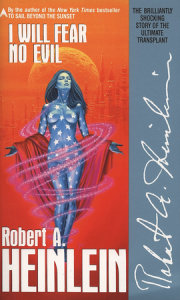One
The room was old-fashioned, 1980 baroque, but it was wide, long, high, and luxurious. Near simulated view windows stood an automated hospital bed. It looked out of place but was largely concealed by a magnificent Chinese screen. Forty feet from it a boardroom table also failed to match the decor. At the head of this table was a life-support wheelchair; wires and tubings ran from it to the bed.
Near the wheelchair, at a mobile stenodesk crowded with directional mikes, voice typewriter, clock-calendar, controls, and the usual ancillaries, a young woman sat. She was beautiful.
Her manner was that of the perfect unobtrusive secretary but she was dressed in a current exotic mode. "Half & Half"-right shoulder and breast and arm concealed in jet-black knit, left leg sheathed in a scarlet tight, panty-ruffle in both colors joining them, black sandal on the scarlet side, red sandal on her bare right foot. Her skin paint was patterned in the same scarlet and black.
On the other side of the wheelchair was an older woman garbed in a nurse's conventional white pantyhose and smock. She ignored everything but her dials and a patient in the chair. Seated around the table were a dozen-odd men, most of them in spectator-sports style affected by older executives.
Cradled in the life-support chair was a very old man. Except for restless eyes, he looked like a poor job of embalming. No cosmetic help had been used to soften the brutal fact of his decrepitude.
"Ghoul," he was saying softly to a man halfway down the table. "You're a slavering ghoul, Parky me boy. Didn't your father teach you that it is polite to wait for a man to stop kicking before you bury him? Or did you have a father? Erase that last, Eunice. Gentlemen, Mr. Parkinson has moved that I be invited to resign as chairman of the board. Do I hear a second?"
He waited, looking from face to face, then said, "Oh, come now! Who is letting you down, Parky? You, George?"
"I had nothing to do with it."
"But you would love to vote 'Aye.' Motion fails for want of a second."
"I withdraw my motion."
"Too late, Parkinson. Erasures are made only by unanimous consent, implied or overt. One objection is enough-and I, Johann Sebastian Bach Smith, do so object . . . and that rule controls because I wrote it before you learned to read.
"But"-Smith looked around at the others-"I do have news. As you heard from Mr. Teal, all our divisions are in satisfactory shape; Sea Ranches and General Textbooks are more than satisfactory-so this is a good time for me to retire."
Smith waited, then said, "You can close your mouths. Don't look smug, Parky; I have more news for you. I stay on as chairman of the board but will no longer be chief executive. Our chief counsel, Mr. Jake Salomon, becomes deputy chairman and-"
"Hold it, Johann. I am not going to manage this five-ring circus."
"Nobody said you would, Jake. But you can preside at board meetings when I'm not available. Is that too much to ask?"
"Mmm, I suppose not."
"Thank you. I'm resigning as president of Smith Enterprises, and Mr. Byram Teal becomes our president and chief executive officer-he's doing the work; it's time he got the title-and pay and stock options and all the perks and privileges and tax loopholes. No more than fair."
Parkinson said, "Now see here, Smith!"
"Hold it, youngster. Don't start a remark to me with 'Now see here-' Address me as 'Mr. Smith' or 'Mr. Chairman.' What is your point?"
Parkinson controlled himself, then said, "Very well, Mister Smith. I can't accept this. Quite aside from promoting your assistant to the office of president in one jump-utterly unheard of!-if there is a change in management, I must be considered. I represent the second largest block of voting stock."
"I did consider you for president, Parky."
"You did?"
"Yep. I thought about it . . . and snickered."
"Why, you-"
"Don't say it, I might sue. What you forget is that my block has voting control. Now about your block- By company policy anyone representing five percent or more of voting stock is automatically on the board even if nobody loves him and he suffers from spiritual bad breath. Which describes both you and me.
"Or did describe you. Byram, what's the late word on proxies and stock purchases?"
"A full report, Mr. Smith?"
"No, just tell Mr. Parkinson where he stands."
"Yes, sir. Mr. Parkinson, you now control less than five percent of the voting stock."
Smith added sweetly, "So you're fired, you young ghoul. Jake, call a special stockholders' meeting, legal notice, all formalities, for the purpose of giving Parky a gold watch and kicking him out-and electing his successor. Further business? None. Meeting's adjourned. Stick around, Jake. You, too, Eunice. And Byram, if you have anything on your mind."
Parkinson jumped to his feet. "Smith, you haven't heard the last of this!"
"Oh, no doubt," the old man said sweetly. "Meantime my respects to your mother-in-law and tell her that Byram will go on making her rich even though I've fired you."
Parkinson left abruptly. Others started to leave. Smith said mildly, "Jake, how does a man get to be fifty years old without acquiring horse sense? Only smart thing that lad ever did was pick a rich mother-in-law. Yes, Hans?"
"Johann," Hans von Ritter said, leaning on the table and speaking directly to the chairman, "I did not like your treatment of Parkinson."
"Thanks. You're honest with me to my face. Scarce these days."
"Removing him from the board is okay; he's an obstructionist. But there was no need to humiliate him."
"I suppose not. One of my little pleasures, Hans. I don't have many these days."
A Simplex footman rolled in, hung the vacated chairs on its rack, rolled out; von Ritter continued: "I have no intention of being treated that way. If you want nothing but Yes men on your board, let us note that I control much less than five percent of the voting stock. Do you want my resignation?"
"Good God, no! I need you, Hans-and Byram will need you still more. I can't use trained seals; a man has to have the guts to disagree with me, or he's a waste of space. But when a man bucks me, I want him to do it intelligently. You do. You've forced me to change my mind several times-not easy, stubborn as I am. Now about this other-sit down. Eunice, whistle up that easy chair for Dr. von Ritter."
The chair approached; von Ritter waved it back, it retreated. "No, I haven't time to be cajoled. What do you want?" He straightened up; the boardroom table folded its legs, turned on edge, and glided away through a slot in the wall.
"Hans, I've surrounded myself with men who don't like me, not a Yes man or trained seal among them. Even Byram-especially Byram-got his job by contradicting me and being right. Except when he's been wrong and that's why he needs men like you on the board. But Parkinson-I was entitled to clip him-publicly-because he called for my resignation-publicly. Nevertheless you are right, Hans; 'tit for tat' is childish. Twenty years ago-even ten-I would never have humiliated a man. If a man operates by reflex, as most do instead of using their noggins, humiliating him forces him to try to get even. I know better. But I'm getting senile, as we all know."
Von Ritter said nothing. Smith went on, "Will you stick?-and help keep Byram steady?"
"Uh . . . I'll stick. As long as you behave yourself." He turned to leave.
"Fair enough. Hans? Will you dance at my wake?"
Von Ritter looked back and grinned. "I'd be delighted!"
"Thought so. Thanks, Hans. G'bye."
Smith said to Byram Teal, "Anything, son?"
"Assistant Attorney General coming from Washington tomorrow to talk to you about our Machine Tools Division buying control of Homecrafts, Limited. I think-"
"To talk to you. If you can't handle him, I picked the wrong man. What else?"
"At Sea Ranch number five we lost a man at the fifty-fathom line. Shark."
"Married?"
"No, sir. Nor dependent parents."
"Well, do the pretty thing, whatever it is. You have those videospools of me, the ones that actor fellow dubbed the sincere voice onto. When we lose one of our own, we can't have the public thinking we don't give a hoot."
Jake Salomon added, "Especially when we don't."
Smith clucked at him. "Jake, do you have a way to look into my heart? It's our policy to be lavish with death benefits, plus the little things that mean so much."
"-and look so good. Johann, you don't have a heart-just dials and machinery. Furthermore you never did have."
Smith smiled. "Jake, for you we'll make an exception. When you die, we'll try not to notice. No flowers, not even the customary black-bordered page in our house organs."
"You won't have anything to say about it, Johann. I'll outlive you twenty years."
"Going to dance at my wake?"
"I don't dance," the lawyer answered, "but you tempt me to learn."
"Don't bother, I'll outlive you. Want to bet? Say a million
to your favorite tax deduction? No, I can't bet; I need your help to stay alive. Byram, check with me tomorrow. Nurse, leave us; I want to talk with my lawyer."
"No, sir. Dr. Garcia wants a close watch on you at all times."
Smith looked thoughtful. "Miss Bedpan, I acquired my speech habits before the Supreme Court took up writing dirty words on sidewalks. But I will try to use words plain enough for you to understand. I am your employer. I pay your wages. This is my home. I told you to get out. That's an order."
The nurse looked stubborn, said nothing.
Smith sighed. "Jake, I'm getting old-I forget that they follow their own rules. Will you locate Dr. Garcia-somewhere in the house-and find out how you and I can have a private conference in spite of this too-faithful watchdog?"
Shortly Dr. Garcia arrived, looked over dials and patient, conceded that telemetering would do for the time being. "Miss MacIntosh, shift to the remote displays."
"Yes, Doctor. Will you send for a nurse to relieve me? I want to quit this assignment."
"Now, Nurse-"
"Just a moment, Doctor," Smith put in. "Miss MacIntosh, I apologize for calling you, 'Miss Bedpan.' Childish of me, another sign of increasing senility. But, Doctor, if she must leave-I hope she won't-bill me for a thousand-dollar bonus for her. Her attention to duty has been perfect . . . despite many instances of unreasonable behavior on my part."
"Uh . . . see me outside, Nurse."
When doctor and nurse had left, Salomon said dryly, "Johann, you are senile only when it suits you."
Smith chuckled. "I do take advantage of age and illness. What other weapons have I left?"
"Money."
"Ah, yes. Without money I wouldn't be alive. But I am childishly bad-tempered these days. You could chalk it up to the fact that a man who has always been active feels frustrated by being imprisoned. But it's simpler to call it senility . . . since God and my doctor know that my body is senile."
"I call it stinking bad temper, Johann, not senility-since you can control it when you want to. Don't use it on me; I won't stand for it."
Smith chuckled. "Never, Jake; I need you. Even more than I need Eunice-though she's ever so much prettier than you. How about it, Eunice? Has my behavior been bad lately?"
His secretary shrugged-producing complex secondary motions pleasant to see. "You're pretty stinky at times, Boss. But I've learned to ignore it."
"You see, Jake? If Eunice refused to put up with it-as you do-I'd be the sweetest boss in the land. As it is, I use her as a safety valve."
Salomon said, "Eunice, any time you get fed up with this vile-tempered old wreck you can work for me, at the same salary or higher."
"Eunice, your salary just doubled!"
"Thank you, Boss," she said promptly. "I've recorded it. And the time. I'll notify Accounting."
Smith cackled. "See why I keep her? Don't try to outbid me, you old goat, you don't have enough chips."
"Senile," Salomon growled. "Speaking of money, whom do you want to put into Parkinson's slot?"
"No rush, he was a blank file. Do you have a candidate, Jake?"
"No. Although after this last little charade it occurs to me that Eunice might be a good bet."
Eunice looked startled, then dropped all expression. Smith looked thoughtful. "It had not occurred to me. But it might be a perfect solution. Eunice, would you be willing to be a director of the senior corporation?"
Eunice flipped her machine to "NOT RECORDING." "You're both making fun of me! Stop it."
"My dear," Smith said gently, "you know I don't joke about money. As for Jake, it is the only subject sacred to him-he sold his daughter and his grandmother down to Rio."
"Not my daughter," Salomon objected. "Just Grandmother . . . and the old girl didn't fetch much. But it gave us a spare bedroom."
"But, Boss, I don't know anything about running a business!"
"You wouldn't have to. Directors don't manage, they set policy. But you do know more about running it than most of our directors; you've been on the inside for years. Plus almost inside during the time you were my secretary's secretary before Mrs. Bierman retired. But here are advantages I see in what may have been a playful suggestion on Jake's part. You are already an officer of the corporation as Special Assistant Secretary assigned to record for the board-and I made you that, you'll both remember, to shut up Parkinson when he bellyached about my secretary being present during an executive session. You'll go on being that-and my personal secretary, too; can't spare you-while becoming a director. No conflict, you'll simply vote as well as recording. Now we come to the key question: Are you willing to vote the way Jake votes?"
She looked solemn. "You wish me to, sir?"
"Or the way I do if I'm present, which comes to the same thing. Think back and you'll see that Jake and I have always voted the same way on basic policy-settling it ahead of time-while wrangling and voting against each other on things that don't matter. Read the old minutes, you'll spot it."
Copyright © 2021 by Robert A. Heinlein. All rights reserved. No part of this excerpt may be reproduced or reprinted without permission in writing from the publisher.












